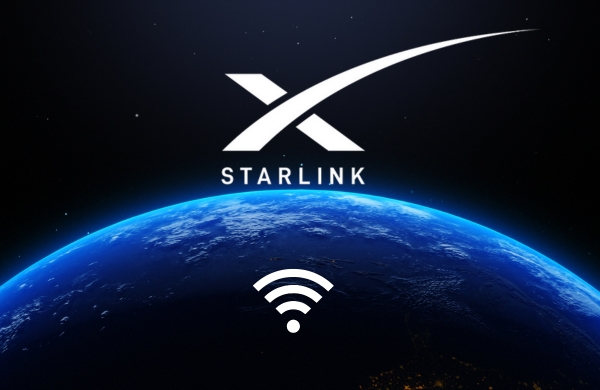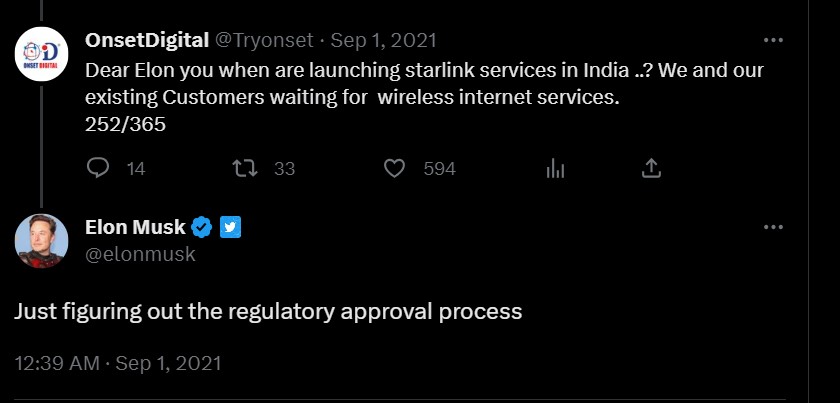
The internet has become an essential part of our lives. However, not everyone has equal access to this invaluable resource. In remote or rural areas, the lack of internet infrastructure or exorbitant costs often hinder access to the digital world. The potential arrival of Starlink, Elon Musk’s satellite internet venture, in India could be a game-changer for bridging this digital divide.
However, a fierce battle has ensued between Starlink and India’s billionaire entrepreneur, Mukesh Ambani, who leads Reliance Jio, the country’s dominant internet market player. Let’s delve into this clash of titans and explore its implications for India’s digital landscape.
Starlink
Starlink, a company founded by Elon Musk, aims to provide global satellite, internet coverage by deploying a constellation of small, low Earth orbit (LEO) satellites. With its ambitious goal, Starlink could potentially bring reliable and high-speed internet access to remote areas around the world, including India. This development would undoubtedly be a boon for communities currently deprived of internet connectivity.
Also Read: Nvidia Surges Toward $1 Trillion Market Value on AI Boom
Reliance Jio
Mukesh Ambani’s Reliance Jio has played a transformative role in revolutionizing India’s internet market. Having already captured a significant market share with its mobile network services and wired broadband connections, Reliance Jio has emerged as a dominant force. However, the entry of Starlink poses a formidable challenge to Reliance Jio’s dominance.
The Auction vs. Licensing Debate
At the heart of the conflict lies the question of whether India should auction satellite spectrum or opt for licensing agreements, a matter of contention, not only between Starlink and Reliance Jio but also involving other industry players such as Amazon’s Project Cooper and the British government-backed OneWeb.
Starlink argues that spectrum, being a natural resource, should be shared among companies rather than subject to auctions that may raise costs for the company. Advocating a global trend, Starlink has lobbied the Indian government to adopt licensing agreements. On the other hand, Reliance Jio and other proponents of auctions argue for a level playing field and fair competition in the satellite broadband market.

The Public Consultation and Industry Response
India’s government initiated a public consultation on satellite spectrum, receiving 64 responses from companies, industry groups, and other stakeholders. Among these, 48 favored licensing agreements, while 12 supported auctions. The remaining responses were neutral. The battle lines have been drawn, and the outcome will have far-reaching consequences for the Indian satellite broadband service market.
Also Read: India’s Digital Payment Revolution: Ushering in a Cashless Era
Implications and the Way Forward
The entry of Starlink into India could usher in a new era of competition, benefiting consumers through lower prices and improved services. Reliance Jio’s existing market dominance may face a formidable challenge, but it also highlights the company’s determination to maintain its position as a market leader.
As Deloitte India projects a 36% annual growth in the satellite broadband service market, reaching $1.9 billion by 2030, the stakes are high for both Starlink and Reliance Jio. Ultimately, the Indian government’s decision on licensing agreements versus auctions will shape the future of satellite internet in the country.
Conclusion
The potential arrival of Starlink in India holds tremendous promise for bridging the digital divide and providing internet access to remote and underserved areas. However, the clash with Reliance Jio and the debate over licensing agreements versus auctions has created a battleground for dominance in the satellite broadband market.
The outcome of this battle will not only impact the market players but also determine the extent of connectivity and affordability for millions of Indians. As the fight unfolds, it remains to be seen who will emerge as the victor and shape the future of satellite internet in India.

Leave a Reply